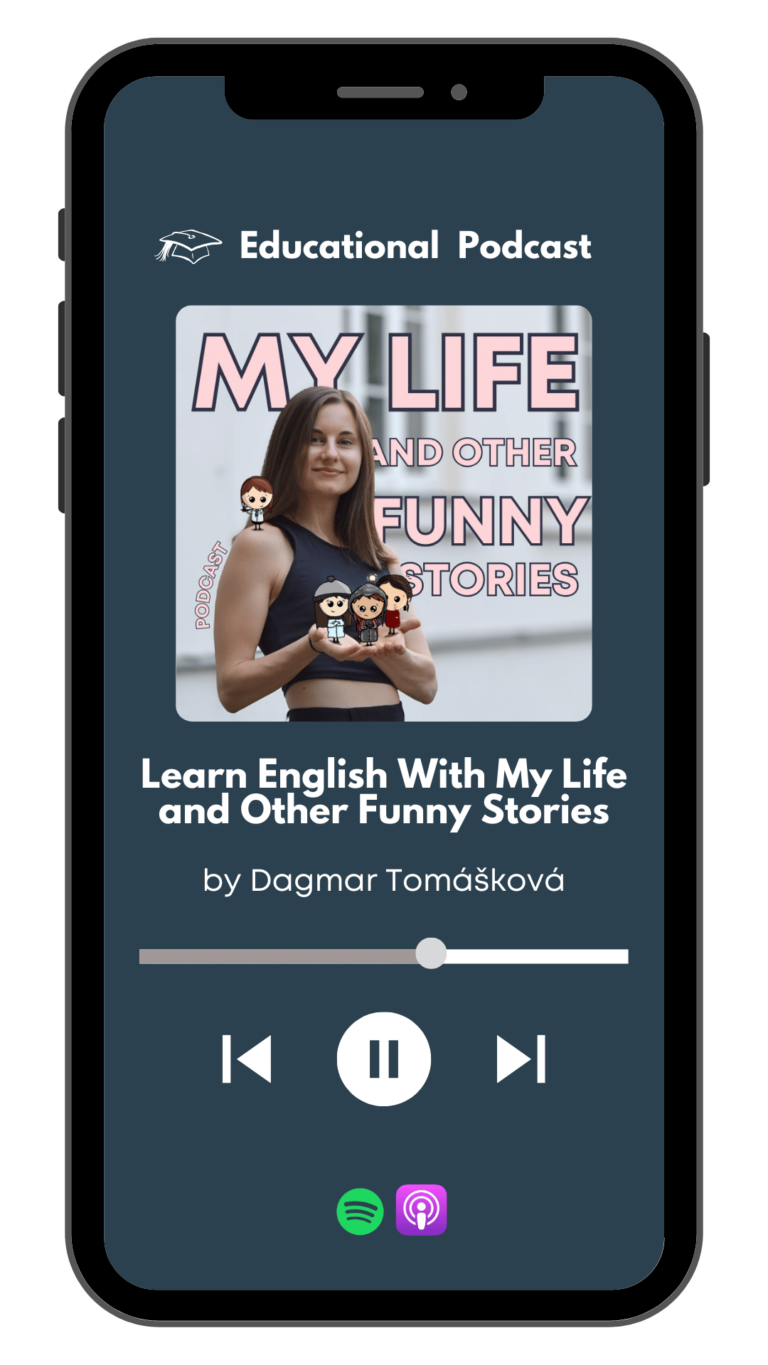
Ep.96: Not Seeing Results On Your Language Journey? Here’s Why And What To Do About It
Today’s topic is one that a lot of my students have been asking me about, and also something I’ve had to deal with myself lately. And the title says it all: „I don’t see any results… what now?“
Does it sound familiar to you?

LISTEN TO THE EPISODE HERE:
soon <3

Pokud chceš tento podcast a mou tvorbu podpořit, teď můžeš tady!

WRITTEN TRANSCRIPTION OF THE PODCAST
Hello and welcome to my podcast My Life and Other Funny Stories. My name is Dagmar Tomášková, I am an English tutor and coach and I created this podcast for English students who want to improve their oral comprehension. As always, you can find the transcription of this episode and the vocabulary list in the notes of the podcast.
Today’s topic is one that a lot of my students have been asking me about, and also something I’ve had to deal with myself lately. And the title says it all: „I don’t see any results… what now?“
Does it sound familiar to you?
It is not a one-answer type of issue. It has many variants. So we’re going to dive into four different perspectives, and I want you to listen carefully and try to figure out where you are. Because here’s the thing: not everyone is stuck for the same reason. So listen to my explanations and ask yourself. Because you are the only one who truly knows why you feel stuck.
1. You’re making progress… it’s just slooooow
Okay. Let’s start with the most innocent of all and also the very common one, especially among my students.
You are making progress. You really are.
It’s just so slow that it’s basically invisible. Like your hair slowly growing every day. You don’t see a difference from Monday to Tuesday but looking at a picture from four months ago, you can definitely see they grew!
Here’s the problem: You’re probably checking for results every single day.
“Did I get better today? No? Okay, I’m a failure.” Stop. Please.
Progress in language learning is NOT linear.
And it’s definitely not daily. There are no fireworks every week.
Some weeks you’ll be awesome, using new vocabulary, understanding the grammar…
And other weeks? You’ll feel like your brain is full of mashed potatoes.
What you need is a long-term mindset.
Milestones will come-but they don’t have a fixed schedule. So maybe stop asking yourself every Tuesday if your English is better than it was on Monday.
Instead, ask: “Where was I six months ago?” Or maybe just leave the question of progress in a drawer for a second – just don’t evaluate yourself. Just do your everyday practice, don’t focus on the progress and when it comes, you will know it!
2. You are progressing, but you’re also kinda mean to yourself
This one is personal, okay? Because some of you are not just impatient – you’re also your worst critic and enemy.
You say things like:
“Ugh, my grammar sucks. I’ll never get this. I’m so bad at English. I haven’t made any progress. This is useless. I should give up.”
Would you say this to your best friend? If someone else were doing everything you do, would you tell them that they suck and haven’t made any progress? No? Then don’t say it to yourself either.
I know. It’s hard to feel proud of yourself when you keep telling yourself you suck. Your brain literally won’t allow you to feel joy or motivation if you bully it constantly. I was listening to a song where the lyrics went like this:
Every day when you get up and think you’ll never be great
You’ll never be great, not because you’re not, but the hate
Will always find a way to cut you up and murder your faith
And it is true. Your self-criticism will murder your hope and positive thinking.
So maybe it’s time for some positive self-talk.
And because I love an action step, here’s one:
Write down everything you’ve done for your English in the last six months.
What did you learn? What podcasts did you listen to? What grammar topic did you finally understand, even if only a little?
Look at the list. And then say out loud to your mirror-self:
“You got this. We can do it.”
Yes, it’s awkward and ses, you’ll feel ridiculous. But c’mon, no one can see you. I talk to myself all the time and yes, sometimes in the mirror too. And I don’t care. Do you care?
Ok, so do it.
3. You’re not stuck, you’re maintaining
This one might be hard to hear. It is difficult for me to accept also in French. You’re working, you’re learning, you’re doing something, but you’re not seeing results. Why?
Because you’re not exactly moving forward... but you’re also not going backwards.You’re maintaining. And maintaining a language, especially at a higher level, is hard.
Think about it. If you’re B2 or higher, it takes a lot of effort just to stay there. You need to keep reviewing, practicing, remembering, revising – you already know so many words and grammar that it is difficult to keep it all in. It’s not that you’re not trying hard enough. It’s that you’re working just hard enough to keep what you already have.
And that’s still a win.That’s like going to the gym and keeping your strength—not gaining muscle, but not losing it either. By the way, that’s me in the gym also. I go to the gym 4-5 times a week and I don’t really see a huge progress or anything. But just keeping up my performance takes a lot so if I don’t push harder, I won’t have any personal records. It is what it is, my friends.
So if you feel like that’s you, ask yourself:
“Do I want to stay here, or do I want to go further?”
If the goal is further, you’ll need to push a little more. Add something new. Challenge yourself again. Add conversations, apply for language coaching, sign up for a group conversation course or just get an advanced grammar book and get down to studying. Sometimes you just need to do even more.
4. Here’s the tough one: maybe you’re just not doing enough
Here is where the tough love part comes into place.
Maybe you’re not doing anything wrong, but also… not doing enough. You tell yourself, “I’m learning! I watch Netflix with subtitles!” My dear friend. That’s entertainment, that’s fun. Not studying. I mean, it is nice, it will give you something, I am not saying it won’t but it won’t teach you English on its own.
Unless you’re pausing, repeating, writing things down, and using new words… that’s passive input, not active learning.
Learning a language is hard. It requires focus. Effort. Repetition. Practice. Mistakes. Boredom. We can’t have fun 100% of the time. I mean, we can have fun for some parts of the journey but if it was so easy, if it was so fun, everyone would be speaking English perfectly.
So take a look at your week and be honest:
Are you actually studying?
Or are you feeling like you’re studying while multitasking with Instagram and thinking about dinner and watching Netflix?
It’s okay if the answer is “not really.” That’s where we start. Don’t be ashamed or anything, this is just a reality and at least you will be honest with yourself.
Now the question is: What can you do today that’s 10% more than yesterday?
It doesn’t have to be 100%. And it definitely doesn’t have to be perfect. Try just 10%. That’s all you need. and see how it goes.
So. Where are you?
Slow progress but it’s happening?
Making progress but being too hard on yourself?
Stuck in maintenance mode?
Or just… kinda chilling and hoping the language will magically absorb into your brain?
Whatever it is, you’re not alone. I am not just pulling these scenarios out of thin air. I have seen many many people belonging to each of them. So wherever you are, you are not the first one or the last one. But now you know. And that’s where real progress begins.
Thank you for listening! If you liked this episode, please leave a five-star rating and share it with your friends. Don’t forget, you can find the transcript and vocabulary list in the notes of the podcast. See you next time. Bye bye

VOCABULARY LIST
the title says it all – název říká vše
does it sound familiar? – zní ti to povědomě?
we’re going to dive into – ponoříme se do (tématu)
stuck – zaseknutý, stagnující
the most innocent of all – nejméně “závažná” (možnost), nejvíce nevinná
basically invisible – prakticky neviditelný
there are no fireworks – nejsou žádné oslavy / ohňostroje (ve smyslu: není to vzrušující)
mashed potatoes – kašovitý mozek (přeneseně: mít mozek jako bramborovou kaši)
long-term mindset – dlouhodobé nastavení mysli
fixed schedule – pevně daný harmonogram
put something in a drawer – dát něco do šuplíku, odložit myšlenku
kinda mean to yourself – tak trochu na sebe zlá
your worst critic – tvůj nejhorší kritik
self-talk – vnitřní monolog, způsob, jakým sám se sebou mluvíš
awkward – trapný, divný
ridiculous – směšný
maintaining – udržování (např. úrovně jazyka)
moving forward – posouvat se dopředu
reviewing – opakování
revising – opakování učiva
keep it all in – udržet si to všechno (v hlavě)
that’s still a win – i tak je to výhra
personal records – osobní rekordy
apply for – přihlásit se do / požádat o
tough love – tvrdá láska (upřímnost s úmyslem pomoci)
passive input – pasivní vstřebávání (informací)
active learning – aktivní učení
requires effort – vyžaduje úsilí
multitasking – dělat více věcí najednou
pull something out of thin air – vytáhnout něco z ničeho (vymyslet si)
where real progress begins – kde skutečný pokrok začíná